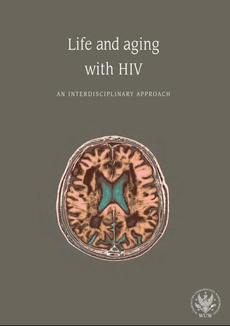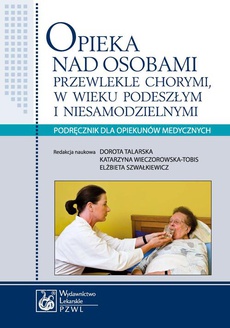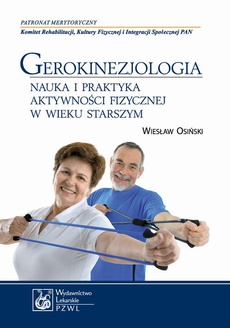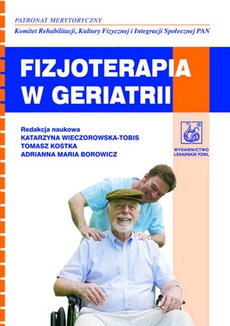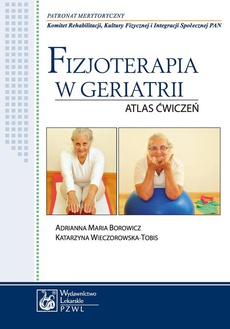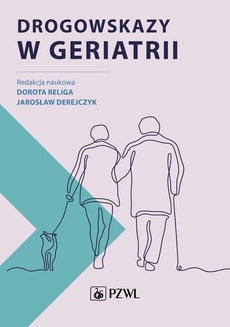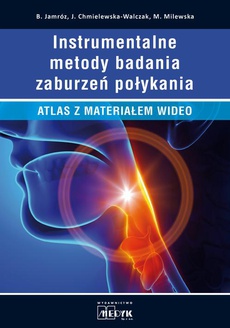POLECAMY
Life and aging with HIV
An interdisciplinary approach
Redakcja:
Agnieszka Pluta, Emilia Łojek, Bogusław Habrat, Andrzej Horban
Wydawca:
Format:
pdf, ibuk
A monograph on the epidemiology and course of HIV infections, neuroimaging diagnostics, and the cognitive adaptation (psychological functioning) of people infected with HIV, as well as their aging processes – with a particular emphasis on their olfactory and auditory functions and metabolic bone diseases. The authors - neuropsychologists, psychiatrists, radiologists, and audiologists - present the results of their own research and a reliable and critical review of the current body of literature. This publication is addressed to psychologists and caregivers of people infected with HIV.
*********
Życie i starzenie się z HIV. Interdyscyplinarne podejście
Angielskojęzyczne wydanie elektroniczne monografii poświęconej epidemiologii i przebiegowi zakażeń HIV, diagnostyce neuroobrazowej, funkcjonowaniu psychicznemu oraz procesom starzenia, ze szczególnym uwzględnieniem funkcji węchowych i słuchowych oraz metabolicznych chorób kości u osób zakażonych wirusem HIV.
Publikacja wyjątkowa ze względu na kompleksowość oraz interdyscyplinarność poruszanej w niej problematyki – autorami zebranych w niej tekstów są specjaliści w takich dziedzinach, jak neuropsychologia, psychiatria, radiologia, audiologia i inne. Jako jedyna jak dotąd monografia w Polsce prezentująca kwestie związane z zakażeniami HIV, zawierająca rzetelny i krytyczny przegląd aktualnej literatury i opisująca wyniki własnych badań autorów znajdzie z pewnością ważne miejsce w procesie kształcenia i doskonalenia kadr medycznych i psychologów, zajmujących się opieką nad osobami zakażonymi HIV.
*********
Dr Agnieszka Pluta – w 2006 roku ukończyła studia magisterskie na Wydziale Psychologii Uniwersytetu Warszawskiego, gdzie zrealizowała program specjalizacji neuropsychologii klinicznej. Jej zainteresowania naukowe skupiają się wokół neuropsychologii poznawczej oraz badania mózgowych mechanizmów zachowań społecznych. Autorka lub współautorka 17 artykułów naukowych, rozdziału w monografii oraz ponad 40 wystąpień konferencyjnych w kraju i za granicą. W latach 2009-2010 stypendystka Fulbrighta w SaxeLab w Massachusetts Institute of Technology, gdzie badała neuronalne korelaty empatii oraz teorii umysłu. Od 2006 roku prowadzi autorskie seminaria dla studentów psychologii dotyczące m.in. badania wyższych procesów poznawczych z wykorzystaniem techniki czynnościowego rezonansu magnetycznego.
W roku 2012 otrzymała stopień doktora nauk humanistycznych (dyplom z wyróżnieniem). Pracę naukową kontynuuje na Wydziale Psychologii Uniwersytetu Warszawskiego oraz w Naukowym Centrum Obrazowania Biomedycznego w Instytucie Fizjologii i Patologii Słuchu.
Prof. Emilia Łojek – profesor zwyczajny na Wydziale Psychologii Uniwersytetu Warszawskiego. Specjalizuje się w neuropsychologii klinicznej. Studiowała i realizowała prace naukowe w Applied Psychology Unit University of Cambridge (UK), University College London (UK), College of Medicine Ohio State University (USA).
Opublikowała wiele prac naukowych na temat m.in. problemów porozumiewania się językowego osób z uszkodzeniami mózgu, zmian funkcji neuropsychologicznych u pacjentów z chorobami neurodegeneracyjnymi, u osób żyjących z wirusem HIV oraz osób w podeszłym wieku.
Autorka lub współautorka adaptacji oraz oryginalnych testów do diagnozy neuropsychologicznej (H-RNTB, RHLB, RFFT, CVLT, CTT, KPD) i prac dotyczących rehabilitacji neuropsychologicznej. Pełni funkcję członka Zarządu International Neuropsychological Society.
---------
Dr Agnieszka Pluta – an employee of the Faculty of Psychology at the University of Warsaw and the Scientific Center for Biomedical Imaging of the Institute of Physiology and Pathology of Hearing.
Prof. Emilia Łojek – is a full professor at the Faculty of Psychology at the University of Warsaw. She specializes in clinical neuropsychology.
| Rok wydania | 2018 |
|---|---|
| Liczba stron | 318 |
| Kategoria | Geriatria |
| Wydawca | Uniwersytet Warszawski |
| ISBN-13 | 978-83-235-3513-3 |
| Numer wydania | 1 |
| Informacja o sprzedawcy | ePWN sp. z o.o. |
Ciekawe propozycje
Spis treści
| Introduction | |
| References | |
| PART I. Treatment vs new portrait of the HIV epidemic | |
| CHAPTER 1. Epidemiology of HIV infection in Poland in light of the situation in Europe and worldwide | |
| Conclusions | |
| References | |
| CHAPTER 2. Tolerance of the antiretroviral treatment vs aging of the individuals living with HIV | |
| Summary | |
| References | |
| PART II. RESEARCH ON THE BRAIN IN HIV INFECTION – CURRENT CHALLENGES | |
| CHAPTER 3. Aging of the brain in HIV infection | |
| Introduction | |
| Physiological aging of the brain | |
| Morphological exponents of changes in the brain | |
| due to aging | |
| Immune response changes associated with age | |
| Neurobiochemical changes in the aging brain | |
| Changes in the central nervous system in HIV | |
| infection | |
| Entering of HIV into the CNS | |
| Destruction of nerve cells | |
| Compartmentalization of HIV in the CNS | |
| Chronic inflammation of the CNS and activation of | |
| the immune system | |
| Pathomorphological changes in the CNS | |
| Neuroimaging studies | |
| Clinical manifestations of HIV infection in the | |
| CNS | |
| Antiretroviral therapy and the CNS | |
| Factors influencing brain aging in HIV-infected | |
| patients | |
| Age of HIV-infected patients | |
| Processes affecting aging of the brain | |
| ART in elderly patients | |
| Clinical symptoms of brain aging in HIV-infected | |
| individuals | |
| References | |
| CHAPTER 4. The use of magnetic resonance imaging in diagnosing and monitoring cerebral lesions in | |
| HIV-infected patients while taking into account the aging processes | |
| Introduction | |
| Neuroimaging methods and techniques using | |
| magnetic resonance imaging | |
| Conventional structural imaging | |
| Mapping the diffusion tensor parameters | |
| Functional imaging | |
| In vivo spectroscopy | |
| Organic changes in the brain in HIV-infected | |
| patients as observed with MR imaging | |
| The processes of brain aging in MR images | |
| Summary | |
| References | |
| CHAPTER 5. Magnetic resonance spectroscopy studies in patients infected with HIV | |
| Introduction | |
| Proton magnetic resonance spectroscopy | |
| Metabolites measured with the use of MRS | |
| MRS applications in research on the effects of | |
| HIV infection and aging of the central nervous | |
| system | |
| Aging process and HMRS spectrum in healthy as | |
| well as HIV-infected individuals | |
| Aging process and HMRS spectrum in HIV-infected | |
| individuals | |
| The use of the MRS technique in neuroimaging of | |
| the neuropsychological deficits associated with | |
| HIV infection | |
| Summary | |
| References | |
| CHAPTER 6. Mapping brain abnormalities in aging HIV-infected individuals. A review of neuroimaging | |
| studies | |
| Introduction | |
| Structural magnetic resonance imaging studies of | |
| the HIV-infected brain | |
| Functional magnetic resonance imaging studies of | |
| the HIV-infected brain fMRI, HIV and aging | |
| Application of PET in examining the HIV-infected | |
| brain | |
| Application of PET in examining aging HIV- | |
| positive subjects | |
| Conclusions | |
| References | |
| CHAPTER 7. Relationship between white matter integrity and neurocognitive outcomes in human | |
| immunodeficiency virus (HIV) | |
| Background | |
| Method | |
| Database search | |
| Participants | |
| Methodology | |
| DTI analysis | |
| Neuropsychology | |
| Results | |
| General DTI results | |
| DTI correlation with neuropsychology | |
| DTI and the global neuropsychological score | |
| relationship | |
| Specific neurocognitive tests | |
| Processing speed | |
| Verbal learning | |
| Attention interference | |
| Prospective memory | |
| Mental control | |
| Hierarchical perception | |
| No relationship between DTI and neuropsychology | |
| Discussion | |
| References | |
| Appendix 1. Pubmed search syntax | |
| Appendix 2. Participants | |
| Appendix 3. DTI Methodology | |
| Appendix 4. Neuropsychology testing | |
| CHAPTER 8. Aging of the brain in HIV infection: literature review of the studies using resting state | |
| functional magnetic resonance imaging | |
| Introduction | |
| Assumptions underlying RS-fMRI research paradigm | |
| Changes in the spontaneous brain activity related | |
| to aging | |
| Changes in the spontaneous brain activity in | |
| individuals aging with HIV infection | |
| The relationship between RS of the brain and | |
| neurocognitive functioning in HIV infection | |
| Summary | |
| References | |
| PART III. Psychological problems in HIV-infected individuals Nature Reviews | |
| CHAPTER 9. Depressive disorders in individuals with HIV infection in the context of aging | |
| Introduction | |
| Depressive disorders in HIV-infected people | |
| Depressive disorders in the elderly | |
| Aging of HIV-infected people | |
| Summary | |
| References | |
| CHAPTER 10. Factors determining neuropsychological functioning in individuals who live with HIV/AIDS | |
| Introduction | |
| Biological factors | |
| Psychological factors | |
| Depression | |
| Anxiety disorders | |
| Personality Disorders | |
| HIV infection and psychoactive substance | |
| addiction | |
| Demographic factors | |
| Summary | |
| References | |
| CHAPTER 11. Quality of life in persons with HIV infection | |
| Introduction | |
| Research methods for assessing quality of life in | |
| HIV-infected patients | |
| Determinants of quality of life in HIV-infected | |
| persons | |
| HRQoL and demographic variables | |
| HRQoL and social and emotional functioning | |
| HRQoL and mental health | |
| HRQoL and cognitive functioning | |
| HRQOL and HIV infection variables | |
| Summary | |
| References | |
| CHAPTER 12. Cognitive reserve, psychosocial and lifestyle factors and the risk of neurocognitive | |
| impairment in older HIV-infected adults | |
| Introduction | |
| Cognitive aging in HIV infection | |
| Impact of reserve and lifestyle factors on | |
| neuropsychological functioning in older | |
| individuals infected with HIV | |
| Cognitive reserve | |
| Medication adherence | |
| Substance use cessation and nutrition | |
| Employment | |
| Social participation and attitude | |
| Physical activity | |
| Summary | |
| References | |
| CHAPTER 13. Research on the psychological help available for HIV-infected individuals | |
| Introduction | |
| Psychiatric disorders and emotional problems of | |
| infected people | |
| Psychotherapy of people infected with HIV | |
| Evidence-based therapy approach in patients | |
| living with HIV | |
| From evidence-based to constructivist forms of | |
| psychotherapy | |
| Psychotherapy of HIV-infected older adults | |
| Summary | |
| References | |
| Empirical research reports | |
| CHAPTER 14. Age and trauma symptoms intensity and social support in HIV-positive individuals | |
| Introduction | |
| Methods | |
| Participants | |
| Assessment | |
| Statistical analysis | |
| Results | |
| Discussion | |
| Acknowledgements | |
| References | |
| CHAPTER 15. Age vs state of cognitive processes in individuals with HIV/HCV co-infection. Empirical | |
| research | |
| Introduction | |
| Classification of HIV-associated cognitive | |
| impairment | |
| Cognitive impairment associated with HCV | |
| infection | |
| Cognitive impairment associated with HIV and HCV | |
| co-infection | |
| Empirical research | |
| Introduction to empirical research | |
| Methods | |
| Participants | |
| Measurement | |
| Statistical analysis | |
| Results | |
| Discussion | |
| Conclusions | |
| References | |
| CHAPTER 16. Psychological functioning in HIV/HCV co-infected and HCV mono-infected individuals | |
| following hepatitis C treatment | |
| Introduction | |
| Study design and testing procedure | |
| Participants | |
| Clinical characteristics | |
| Variables related to HCV infection | |
| HIV-related variables | |
| Other clinical variables | |
| Methods of psychological assessment | |
| Statistical analysis | |
| Results | |
| Cognitive functions | |
| Mood, fatigue and quality of life | |
| Clinical variables vs psychological tests results | |
| Discussion and conclusions | |
| References | |
| Appendix 1. | |
| Appendix 2. Outcomes on the measurement of | |
| depression, fatigue and health-related quality of | |
| life in the studied groups at three measurements: | |
| before treatment, at week 12, and after | |
| completion of therapy | |
| PART IV. Selected problems | |
| CHAPTER 17. Olfaction capacity – emerging clinical research area in HIV infection | |
| Introduction | |
| Significance of olfactory capacity in humans | |
| Olfactory capacity components and methods of | |
| examining them | |
| Olfactory Abnormalities | |
| Research on the olfactory capacity in HIV- | |
| infected individuals | |
| Summary | |
| References | |
| CHAPTER 18. Auditory functions in HIV-infected adults | |
| Introduction | |
| Hearing loss in HIV infection | |
| Age and hearing loss in HIV infection | |
| HAART and hearing loss in HIV infection | |
| Central auditory deficits in HIV infection | |
| Tinnitus in HIV infection | |
| Vestibular symptoms in HIV infection | |
| Auditory and cognitive functions in HIV infection | |
| Conclusions | |
| References | |
| CHAPTER 19. Metabolic bone diseases in HIV-infected patients | |
| Introduction | |
| Bone tissue – regulatory factors | |
| Bone mineral density | |
| Osteopenia and osteoporosis in HIV-infected | |
| individuals | |
| Pathophysiology of bone mass loss in HIV | |
| infection | |
| Bone fracture risk in HIV+ individuals | |
| Therapeutic options | |
| Conclusions | |
| References | |
| Authors | |

